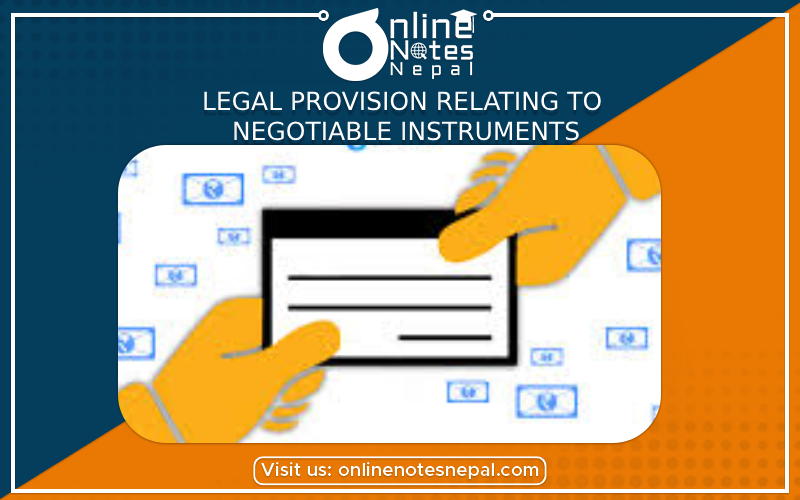Published by: Anu Poudeli
Published date: 07 Aug 2023

Negotiable instruments are essential in today's economic transactions and financial systems. These instruments are used to transfer money or settle debts, making corporate transactions more efficient and safe. Negotiable instruments are governed by special legal laws in various countries, which establish a framework for their usage, rights, and obligations of those involved. The following are some frequent legal provisions concerning negotiable instruments:
1.Negotiable Instruments: Laws in many jurisdictions usually define negotiable instruments. Promissory notes, bills of exchange, and checks are common examples of negotiable instruments. These documents must meet certain requirements, including being in writing, signed by the creator or drawer, conveying an unqualified promise or order to pay a specific amount of money, and being due.
2.Transferability and Negotiability: Transferability is a basic property of negotiable instruments. The legal regulations frequently stipulate that these instruments can be freely transferred from one party to another either through endorsement and delivery (in the case of negotiable instruments payable to order) or through mere delivery (in the case of negotiable instruments payable to bearer). This transferability increases their liquidity and allows payment in a variety of transactions.
3.Holder in due Course : A holder in due process is a person who acquires a negotiable instrument for value, in good faith, and without knowledge of any flaw or defense against it. Legal provisions frequently protect a holder's rights in due course, assuring that they can enforce the instrument against the party that violated it.
4.Parties' Liabilities: The legal provisions specify the parties' liabilities in a negotiable instrument. The writer of a promissory note, for example, is principally obligated to pay the amount mentioned in the note, whereas the drawer of a bill of exchange is primarily obligated if the drawee (the party directed to pay) fails to do so.
5.Presentent and Dishoder : Negotiable instruments must be presented for payment on the due date or within a reasonable time beyond that. The instrument is considered dishonored if it is not paid as required. The requirements and deadlines for presentment, as well as the repercussions of dishonor, are frequently outlined in legal regulations, such as the right to notification of dishonor.
6.Dishonor Notice: When a negotiable instrument is dishonored, the party requesting payment must notify the other parties involved. The legal laws may define when and how this notification should be issued, ensuring that parties are quickly informed of the dishonor.
7.Check Crossing: Legal laws frequently allow for the crossing of checks to add an extra degree of security. Crossed checks can only be deposited into a bank account and not cashed in person. This strategy aids in the prevention of fraudulent actions and lowers the danger of theft.
8.Stamp Duty: Some jurisdictions may levy a stamp duty on certain negotiable instruments, requiring the parties to pay a small fee to the government in order for the instrument to be legally legitimate.
It is crucial to remember that the particular legal regulations governing negotiable instruments may differ from country to country. These rules are commonly found in statutes like the Uniform Commercial Code (UCC) in the United States or the Negotiable Instruments Act in India. If you need to deal with negotiable instruments in a certain jurisdiction, you must first research the relevant legislation and, if necessary, seek legal counsel.